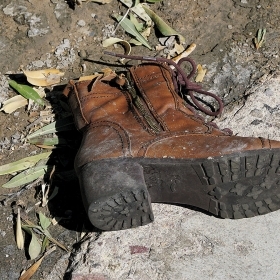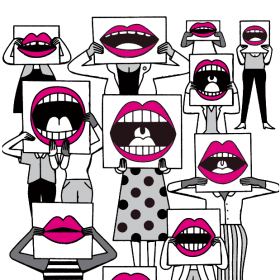My journalism students are almost all women. And they look terrified, because it is their first class on their first day of graduate school,
and I have asked them to go outside and talk to eight strangers. With a microphone.
“They’ll give me a look,” one woman says. She just graduated from college last week.
“They might,” I agree.
“They’ll say no,” another says. “New Yorkers always say no.”
“Yep,” I say. “There will definitely be people who say no. Or who ignore you. Or who wave their hand in your face. That’s part of it. But there will also be people who say yes.”
The assignment is to create a “vox pop,” which in radio means to get opinions from people on the street. In this case, my students will ask about something every New Yorker has an opinion on: the worst or best thing they’ve seen on the subway. I’ve told them that only two of the people they interview can look like them. The other six have to be significantly older, or younger, or a different race or class or gender. This is part of being fair and getting all sides of a story. People who look like you are more likely to have opinions and experiences similar to yours.
We practice being rejected. We practice looking warm and curious and accessible and interested. Still. Everything I am telling them goes against their training as female urbanites. Don’t talk to strangers. Don’t get in other people’s business. Don’t ask questions. If you don’t understand something, just smile politely instead of seeking clarification.
“People don’t just walk up to people and talk to them,” someone says. Someone else adds, “I don’t want to bother anybody.”
I pause. “Well—you’ve now become a different category of person. A journalist.”
They laugh. But I tell them that they now have permission to talk to strangers; in fact, they have an obligation to do it. They have permission to follow their curiosity, their interests, and their instincts: to ask the gathered police officers what’s going on, to talk to the guy at the bodega about a new city policy, to speak to parents at the playground about what is making them angry right now. Their job is to collect all the varied voices of the city.
I say it again, look in each of their eyes. “You have permission. You can talk to anyone. You can call up anyone in the whole world to ask for information. You might not get an answer, but you have permission to ask.”
My students are part-timers, which means that most of them are mid-20s or older. They have spouses, children, jobs. But they are here because they want something more for themselves. Part of my job is to tell them that they can have it.
“You are in the right place,” I say. “I know this is scary. But you can do it.”
I show them how to hold a mic close to a person’s face and a little to the side, so that their “p’s” don’t sound like gunshots. I explain that they can’t talk over someone or interrupt, because they need clean tape—but that also means not saying things like “uh huh” or “I get it,” which we usually do to signal that we’re listening. Instead, they need to look into someone’s eyes and actually listen. Listen so closely that it’s visible on their faces, so that the people being interviewed know that they are heard.
I send them off with a wave and a smile and the whole time they’re gone, I worry. Will they be able to get beyond their comfort zones? Will they trust themselves to handle awkward situations, to let themselves be uncomfortable?
Then they return. And they are glowing. And oh, they have come back with beautiful, moving stories, some dark and sad, others redemptive. One story, about a subway car full of people who stand up for a young black boy, makes me cry.
“Why haven’t I always been doing this?” asks one woman, a mother of two.
I know why. Because they didn’t know they could. Because no one told them they can.
Jennifer Vanasco ’94 is an editor in the newsroom at WNYC public radio and an adjunct assistant professor at the Columbia University Graduate School of Journalism.







We ask that those who engage in Wellesley magazine's online community act with honesty, integrity, and respect. (Remember the honor code, alums?) We reserve the right to remove comments by impersonators or comments that are not civil and relevant to the subject at hand. By posting here, you are permitting Wellesley magazine to edit and republish your comment in all media. Please remember that all posts are public.